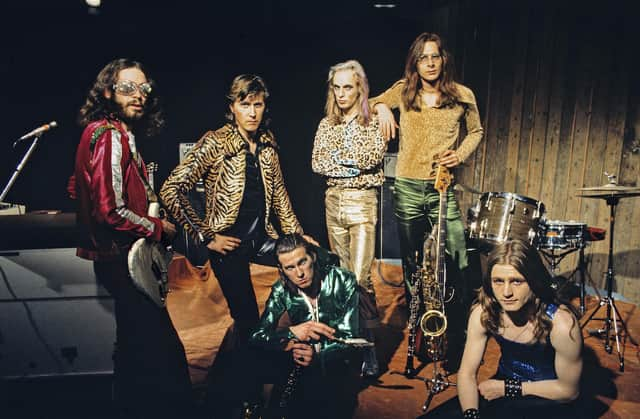Roxy Music could teach today's musicians how to write songs with meaning – Aidan Smith


These guys in the photograph saved my life. OK, that’s a bit melodramatic, but then I was 15 when I first heard them and at that age lots of things can seem like life or death. Maybe not “saved”, but Roxy Music are definitely a big part of why I write for a living.
If they hadn’t stuck “Studebaker” in the lyrics of their debut single I wouldn’t have gone away and looked up what it meant. They namechecked “Robert E. Lee”, but not the one from the American Civil War, so further investigation was required. And “Holzer” was the trickiest reference and a seemingly unfathomable one, but the band were into Pop Art and Andy Warhol, I discovered, had a muse called Baby Jane Holzer. Was that it?
Advertisement
Hide AdAdvertisement
Hide AdWith further mystery contained in its title, revealed to be a brand of cigarette, “Virginia Plain” sparked curiosity and an inquiring mind. I can attribute to it an appreciation of the value of good research, which when successful at the age of 15 with the internet not yet a thing, produced atom-cracking moments. Plus, it taught me new words. All of that from its two minutes and 58 seconds. And it sounded pretty wonderful as well. So, for maybe the 47th time on these pages, I pity the youth. Where are the songs now which intrigue and inspire in a similar way?
A new study has confirmed the awful truth: that pop music has been dumbed down. It’s more repetitive, more predictable. And – prove to me I’m not wrong, Swifties, Sheerios and Harries, being collective terms for fans of Taylor Swift, Ed Sheeran and Harry Styles – more boring as a result. Analysis of 12,000 songs released between 1980 and 2020 by the University of Innsbruck reveals a trend for simpler lyrics and an overuse of choruses. The vocabulary used has shrunk; there are a lot fewer Studebakers around these days.
Why? Well, the pop industry would probably claim it’s been forced into these moves by the dominance of streaming platforms and shrinking attention spans. Back in Roxy Music’s pomp, LPs were played from start to finish. Any intervention required us to stop perving at the impossibly glamorous cover-girl, put down our Creamola Foam, get up from the beanbag, walk over to the hi-fi system and change the record. Generally, though, we committed to listening to the album as a complete, creative enterprise and were hugely rewarded by the experience.
Music consumption today does not have the same patience or willingness to indulge. A button is quickly pressed to halt an undesired song. As in so many areas of modern life, we have enormous power and a superabundance of choice. To be melodramatic again, the abrupt flick to “next track” resembles the thumbs-down gesture which sealed the fate of defeated gladiators in ancient Rome. Such casual brutality. But record producers don’t want this to happen to their songs, so they bully songwriters: “Never mind your esoteric allusions. Hurry up with the bloody chorus!”
Dr Eva Zangerle, who led the study, says: “In the past 40 years, we’ve witnessed a change from buying records in the store to being able to choose from hundreds of millions of songs on the phone. The way music is consumed has changed but also how it’s produced, eg making sure the song is convincing enough to not be skipped within the first seconds.”
Convincing enough or bland enough? There’s definitely less whimsy in pop now, less weirdness and less daring. Perhaps old gits would always argue such but a shrunken industry of far fewer labels will force conservatism on performers, and regrettably some have adopted this willingly – and highly successfully.
A band like Coldplay keep their songs as generic as possible so that everyone in the enormodomes, even the young lovers swaying in the back row, can relate to the words and sing along to the choruses without Robert E. Lee or Baby Jane Holzer popping up and causing consternation. Their lyrics are earnest, imploring codswallop which even Californian self-help gurus would reject for being just too Californian.
“I put my hands up to the sky, I feel alive,” they sing. (Cue a sea of outstretched arms). Coldplayland is a place where clouds come with a “silver lining”. Where you wait for “that bell to ring”. Where angels arrive “from above”. Where the universe is “connected”. Where lightning “strikes”. Where politics is covered by: “And who said we can’t be together?” Because, moving quickly on, there are “rocket ships” and a “higher power” and “didn’t we have fun, oh-oh, ooh-ooh-ooh?”
Advertisement
Hide AdAdvertisement
Hide AdSo is this simply another tedious instalment of the game known as “my favourite band’s better than your favourite band”? Perhaps, but would Frank Zappa get a record contract now? Would Marc Bolan? Even David Bowie might struggle in a world that professes to be worried about the threat of AI and how this could completely take over songwriting but which gives the impression it already did, some time ago.
In Virginia Plain, Roxy Music sang of somewhere “far beyond the pale horizon” and continued to inhabit it. They expanded my vocabulary to include dilettantes, quadrilles, lidos, predilections and the cognoscenti, although most of these were difficult to incorporate into reports of community council meetings and golden wedding celebrations while working for the Dalkeith Advertiser.
Who was Lolita? Who was Zarathustra? What was Guernica? Where was Quaglino’s? Roxy set me on a quest to find out. They were “plying very strange cargo”, at least until the moment when they went and spoiled it all by saying something stupid like… I love you? No, worse than that. There had been a band break-up and a comeback song was scandalously, sacrilegiously titled “Oh Yeah”. It was a big hit.
Comments
Want to join the conversation? Please or to comment on this article.